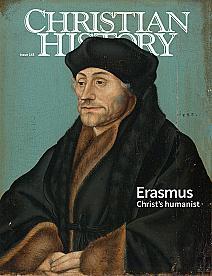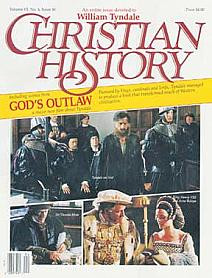Sir Thomas More Dreamed of Utopia and Died Under an Axe
THOMAS MORE was in his early thirties when he came to the notice of King Henry VIII. Highly talented, More was deeply engaged in the renewal of learning taking place in Europe in the early sixteenth century. He learned Latin and Greek and corresponded with like-minded scholars, such as his lifelong friend, famous author Erasmus. Erasmus even dedicated his book, the Praise of Folly to him. More’s own contribution to literature was a slender book of fiction named Utopia, describing life in an ideal country but with an ironic title literally meaning both “good place” and “no place.” Henry VIII sought him as a companion because of his witty conversation.
After More’s son-in-law observed Henry walk with his arm around More’s neck for an hour, he said to his father-in-law, “How happy a man are you, whom the King hath thus familiarly entertained.”
More replied, “I thank our Lord God, Son Roper, I find his Grace my very good Lord indeed. And I think he doth as singularly favor me, as any subject within this realm; howbeit, Son Roper, I may tell thee, I have no great cause to be proud thereof. But if my head could win his Majesty a castle in France* it should not fail to go.”
More was right to be skeptical of the king’s friendship. On this day, 6 July 1535, the king caused his faithful servant’s head to roll.
Henry, once a champion of the Roman Catholic church (he had earned the title “Defender of the Faith” for combating Lutheran ideas), had declared himself head of the church in England because the pope would not grant him a divorce from his first wife Catherine, who had borne him no sons. More had stood beside the king during the years in which Henry attempted to suppress the ideas of the Protestant reformers. He helped the king write his Defense of the Seven Sacraments in response to writings of Luther. Through the press, More also dueled with the reformers Martin Luther and William Tyndale. He destroyed Reformation writings, and was active in arresting and executing Protestants.
After Parliament passed a law confirming that Henry was Supreme Head of the English church, More stood with the Catholics who refused to swear an oath supporting this. To More, faith was not a matter of political convenience. Indeed, around 1500, he had seriously considered becoming a monk, participating in the routine of a Carthusian monastery. Habits of prayer, fasting, and penance remained with him the rest of his life. More counted standing with the pope against the divorce as standing with Christ.. He wrote, “If a man’s cheeks glow sometimes for shame in this world, they will fall on fire for shame when Christ shall show himself ashamed of them there!”
The king sought to convict More on bribery charges, but the charges collapsed in face of More’s well-known integrity. The king then accused him of treason. Sir Richard Rich gave false testimony by which More was condemned to die.
Led eight days later to a shaky scaffold, More said, “I pray you, good M. Lieutenant see me safe up, and for my coming down let me shift for myself.” Turning to the executioner, he continued, “Pluck up thy spirits man, and be not afraid to do thine office: my neck is somewhat short, therefore take heed thou strikest not awry, for saving of thine honesty: but if thou doest, upon my word I will not hereafter cast it in thy teeth.” The axeman struck off his head with a single blow.
—Dan Graves
* England was at war with France.
----- ----- -----
Thomas More was a friend of Erasmus as is shown in Christian History #145, Erasmus "Brethren of the Christian humanist life"
but he hated the Protestant reformation and persecuted William Tyndale Christian History #16, William Tyndale: God's Outlaw
Never miss an issue, subscribe now.







